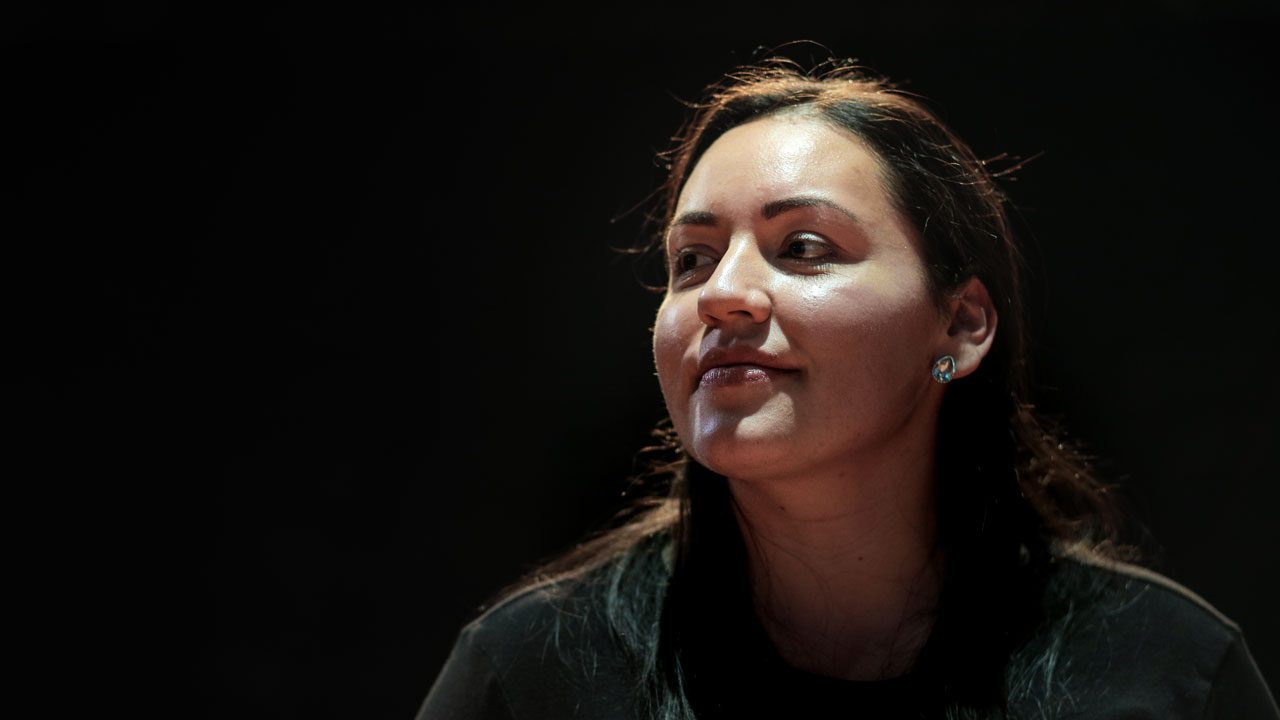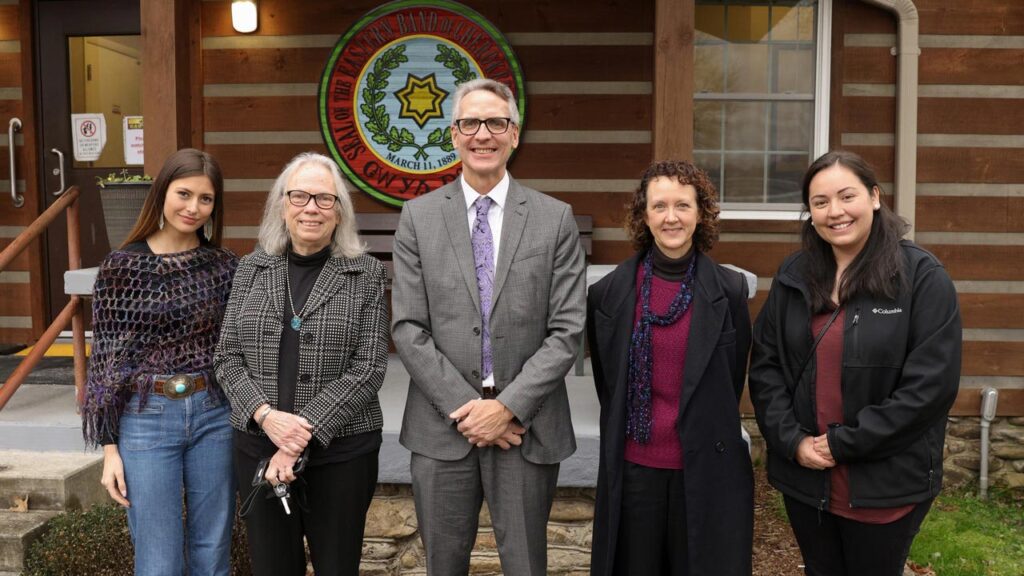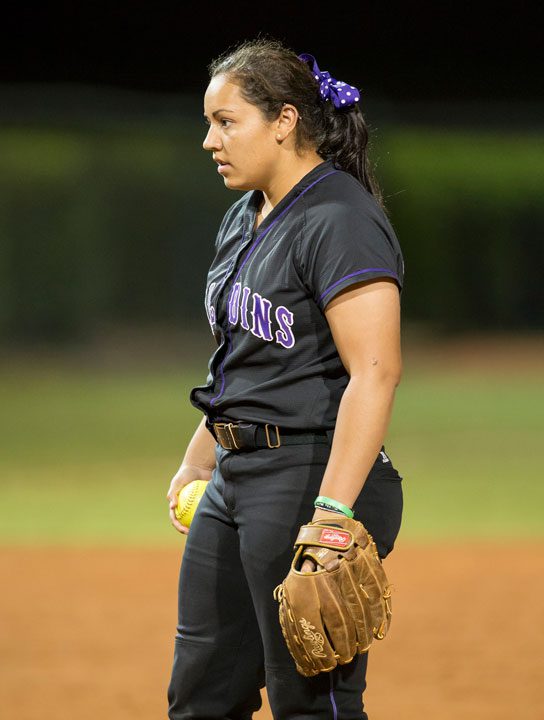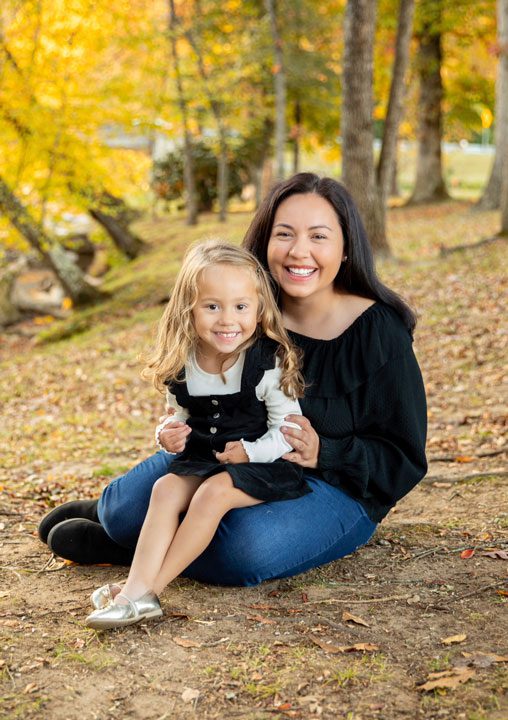of the university
Shelby’s Song

It was Shelby Parker’s turn to walk out onto the softball field. She strode to the pitcher’s mound at Furman’s Pepsi Stadium to a soundtrack of power chords and ’80s-style rap. The song Parker had chosen was “Epic,” by the alternative metal band Faith No More.
But it wasn’t her first choice. She had wanted her walk-out music to be a powwow song.
“I played it for some friends of mine,” recalls Parker, Furman’s first known Cherokee student. The song wasn’t traditional Cherokee music, but it was moving to her.
“And they laughed, and they did the war call,” she says, mimicking them with her open palm moving over her open lips. “I felt so much shame that I thought I was going to cry. But I just laughed,” says Parker. “It was just such a different time at Furman.”

Ahna DeCosty ’25, a member of the Caddo Nation and representative of Furman’s Native American and Indigenous Peoples Student Association, Helen Lee Turner, professor of religion, Ken Peterson, an economics professor who was provost and vice president for academic affairs at the time, Danielle Vinson, professor of politics and international affairs, and Parker stand outside the tribal council house of the Eastern Band of the Cherokee after presenting the land acknowledgment to the tribe in 2022. / Jeremy Fleming
She didn’t want to correct her white friends in that moment. “You don’t want to come across like a ‘savage’ right?” Parker says wryly. So, afterward, she called her father, a tribal council member, for comfort, because who else would understand?
Parker, who graduated in 2015, sought mental health counseling to cope with her cultural isolation at Furman. There were no student groups for people like her, there was no programming. But there were reminders that she was different.
In one class, when students were asked to share a “fun fact” about themselves, one classmate declared, “One summer, I lived on a reservation and built houses.”
It struck Parker as odd.
“I was like, that’s a ‘fun fact?’” she says. “I kind of absorbed it and said, ‘Well, I grew up on a reservation.’”
When she could, Parker, a political science major, invited her classmates into her culture. When the softball team had a game in western North Carolina, she and her family hosted 19 players and the coaching staff. The group was treated to a traditional dance performance and outdoor dinner near a stream on the reservation in Cherokee, North Carolina.
Parker’s close friend and teammate Alexis Galinski Kramer ’14 was a pescatarian, so she asked for fish, expecting a simple restaurant-style filet. “It was the whole fish with an eye,” she says.
Kramer also remembers the embrace of the tribe.
“You could just feel how close everyone was, the team but also everyone who was hosting. It was warm,” she says. “They’d tell stories of when Shelby was little. There’s always a story. It’s about being together.”
As Parker was nearing graduation, things were getting better at Furman. She was elated to learn of Religion Professor Helen Lee Turner’s new May Experience course to a Hopi reservation. And years later, in 2019, Parker says she was “pretty thrilled” that Furman would be making a land acknowledgment, a step that would be followed by others. In it, the university publicly stated that Furman “occupies
traditional land of the Cherokee People, a land where the Catawba and other Indigenous people might also have found food.” In November, the university unveiled a plaque and monument making the acknowledgement a permanent presence on campus.
Resilience through culture
Parker’s eyes fill with tears when she speaks of her grandmother. But with her tears is a resolve – a fierce reverence for her elders and a mission to care for them and learn from them. A deep tenderness for Native American children whose identity and well-being are at risk. And a painful recognition of what her own grandparents and others endured, from forced boarding schools to poverty, health problems such as diabetes and addiction, and limited opportunities.

Parker as a student-athlete during a Furman softball game in 2013. / Furman Sports Information
The tribe has come a long way since her grandparents’ youth. In her work, Parker is helping to power that progress. Earlier in her career, she was a residential counselor for the Cherokee Children’s Home and provided day-to-day care for Native American foster children, such as taking them to medical appointments and doing their hair before dance class. She then went to Family Safety, the tribe’s child-and-adult protective services arm, a job that was enriching and central to her values but drained her emotionally.
Jenna Wiggins worked with Parker as a social worker to build the Tribes Child Welfare program, and in the course of their work it grew from about eight employees to 45. The two are also close, lifelong friends.
“Shelby is a phenomenal advocate for all people, but particularly her people, the Cherokee,” says Wiggins, the human services director of the Eastern Band of Cherokee Indians. “She was a shy person, but as she blossomed in her social work and advocacy, she grew to be a voice for other people.”
Wiggins would watch Parker testify in front of a Cherokee Tribal Court judge and opposing attorneys about what was in the best interest of Native American children and how decisions that day in court would affect the children and their cultural identity for generations to come.
“She was advocating that a child either be reunified with their parent because their parent had now become safe and healthy, or that the parents had not become healthy, so the best thing was to keep that child with their family, so they could now be in the guardianship of a grandparent or aunt or uncle,” says Wiggins.
In June, the U.S. Supreme Court ruled on the broader debate, issuing a decision that Parker says “has been celebrated and will continue to be celebrated in Native communities.” The justices voted 7-2 to uphold the 1978 Indian Child Welfare Act, which means that adoption and foster care proceedings for Indigenous children will continue to give preference to placing children with Native families or institutions from any tribe.
“Giving Native American children a chance to grow up in a healthy, loving, Native home or community helps them maintain their cultural identity,” she adds. “While the child’s safety and happiness should be at the forefront of placement, the opportunity to grow up immersed in their culture should also be considered. Our hope and our future are our children, and they must be regarded as such.”

Parker and her daughter, Acosia, 4. / Courtesy Photo
Today Parker teaches culturally based stress management courses and other programming related to wellness, resilience, mental health and the arts at Cherokee Choices, a chronic disease prevention program within the tribe’s Public Health and Human Services Division.
“I want them to heal from some of the historical trauma they faced, embrace the struggle and embrace the past so we can move forward as a people,” she says. “Helping my people grow and heal helps us all.”
Three generations
Parker maintains a very close relationship to her own grandmother, who teaches the Cherokee language to both Parker and her 4-year-old daughter, Acosia. To Parker, this is a vital bond.
“It’s important for me to raise my daughter to grow up around her,” she says of her “Granny.” Parker’s grandmother was among those prohibited from speaking Cherokee when she was sent to a boarding school under U.S. policies that forcibly removed American Indian, Alaskan Native and Native Hawaiian children from their families and tribes in order to assimilate them.
“I don’t think I’d be where I am today without her,” says Parker. Motherhood, too, has deepened her cultural identity.
“I want to be the best mom I can be” to Acosia, she says. “I want to teach her all I can, and for her to be confident in who she is in all walks of life.”